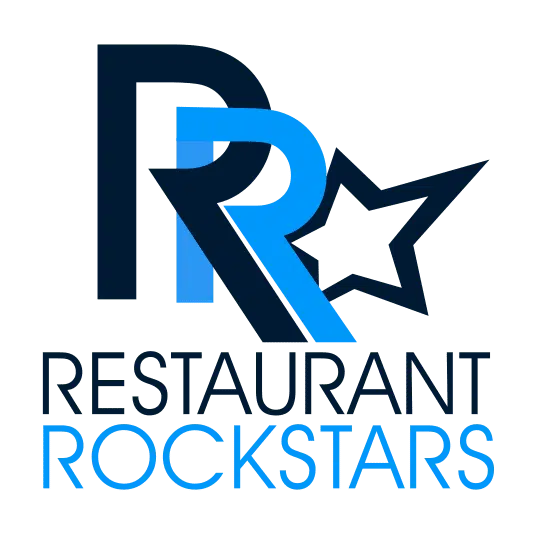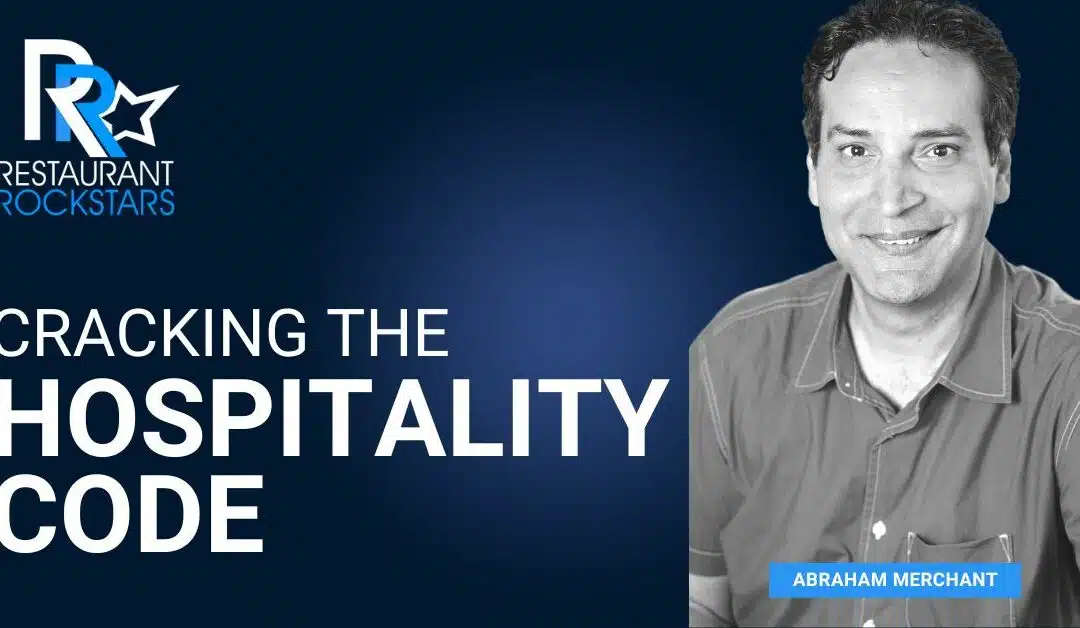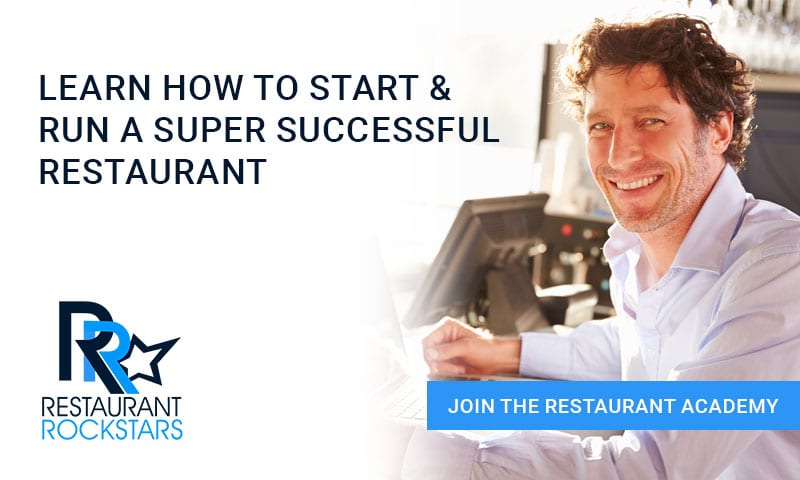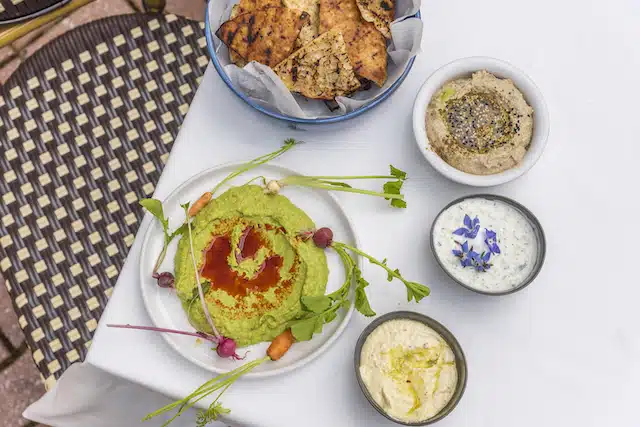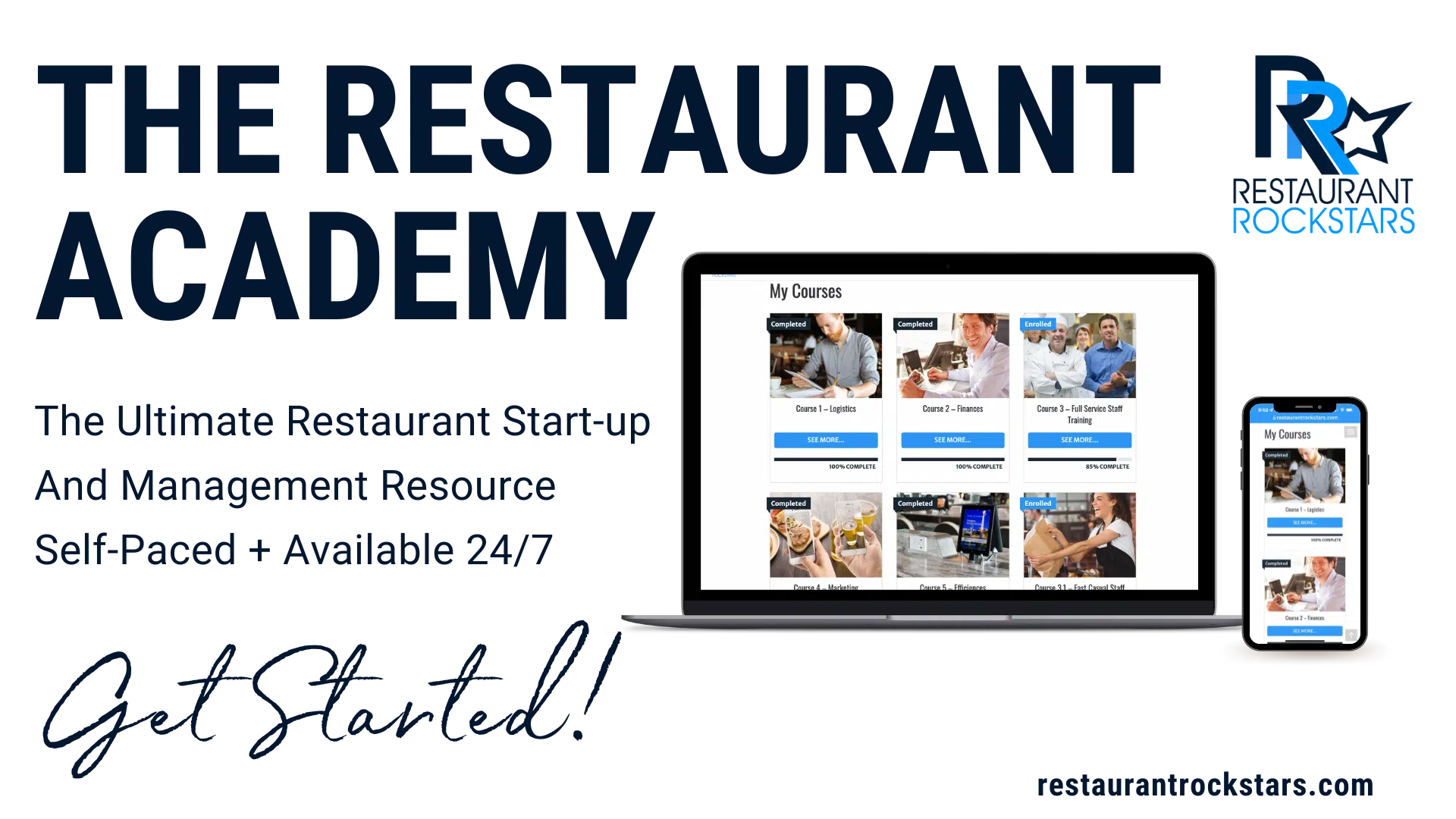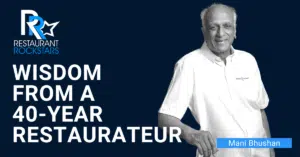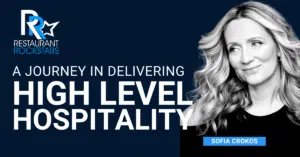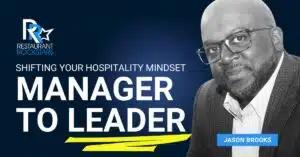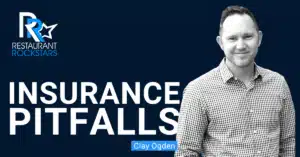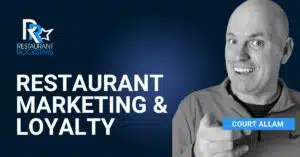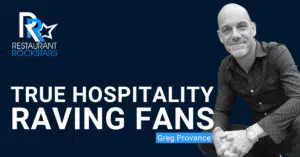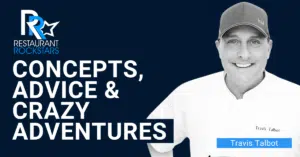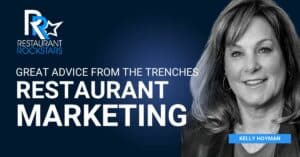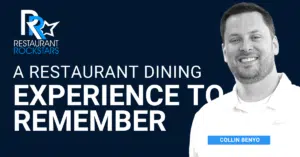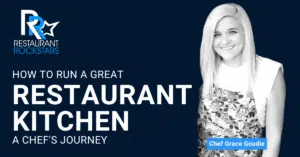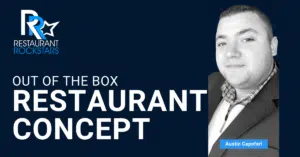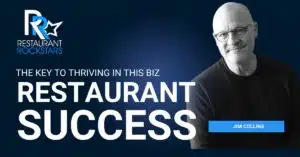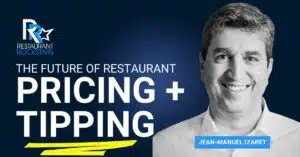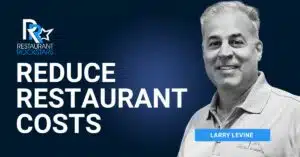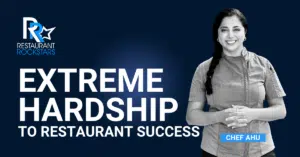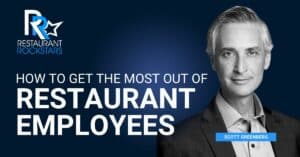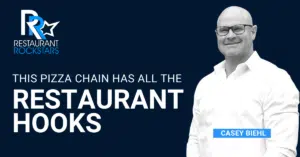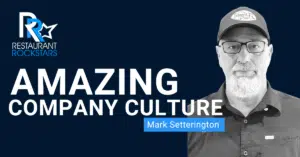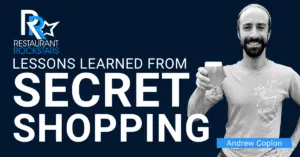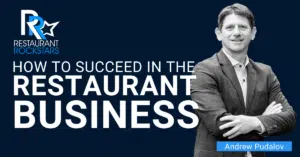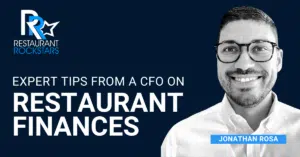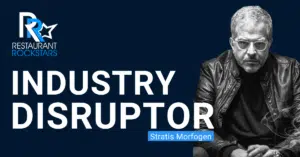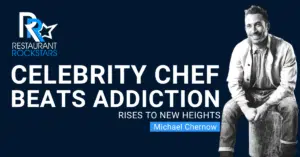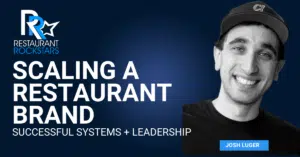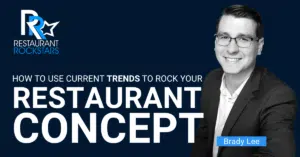Restaurant Rockstars Episode 373
Cracking the Hospitality Code: The Journey of Abraham and his Restaurants
LISTEN HERE OR ON YOUR FAVORITE PODCAST PLAYER
In this episode of the Restaurant Rockstars Podcast, I’m speaking with Abraham Merchant, veteran restaurateur, President & CEO of Merchant’s Hospitality.
Abraham shares his philosophy on hospitality, employee retention, strategies for operational success, and the importance of public relations, marketing, and responding to online reviews.
A major focus of the conversation is Abraham’s attitude towards scaling and maintaining relevance in a competitive landscape like New York City, while also expanding into new markets like Nashville and Miami.
Listen as Abraham shares his restaurant journey including:
- Emigrating from Pakistan and working his way up in this business
- What he learned managing restaurants before starting a powerhouse restaurant group
- Early challenges to ultimate restaurant success
- The true meaning of hospitality and how to build a winning team
- The aftermath of 9/11 and rising above the devastation to help rebuild downtown Manhattan
- Leadership philosophy, loyalty and developing company culture
- A typical day at the top of the organization
- Retaining staff amidst labor challenges
And Abraham’s approach to adding value and growing margins amidst inflation.
Don’t miss this episode, then go out there and Rock YOUR Restaurant!
Roger
Connect with our guest:
Welcome back to the Restaurant Rockstars podcast. It’s a brand new year and we so look forward to bringing you many exciting guests to help you improve your restaurant business. Today’s guest, Abraham Merchant, is the president and CEO of Merchants Hospitality. This gentleman has opened and successfully operated 32 restaurants in New York City.
Talk about competition. This episode is all about leadership. It’s about staying relevant amidst. Tremendous competition. It’s all the pieces. It’s the magic formula of restaurant success. You’re not going to want to miss it, so stay tuned. By the way, I’m giving away the top three ways you’re killing your restaurant profits.
These are immediately actionable ideas to help you increase your restaurant profit. Powerful stuff to help you rock your business. To get it, head on over to restaurantrockstars.com/profits. And a special bonus will also be included, so don’t miss it. Now, on with the episode.
You’re tuned in to the Restaurant Rockstars Podcast. Powerful ideas to rock your restaurant. Here’s your host, Roger Beaudoin.
Rockstars, give your team the gift of PopMenu AI Answering, a simple solution for phones ringing off the hook. AI Answering handles calls 24/7, 365 days a year, so your staff can focus on in person guests.
Customize your greetings and responses. Answer common questions. promote specials and events and send follow up links to ordering and reservations. AI answering handles it all, while escalating more complex conversations back to your team. Now, never miss another tasty revenue opportunity. PopMenu is the marketing technology platform designed to make growing your restaurant easy.
Discover more A. I. restaurant tools that turn your to do list into an already done list. Request a demo today and my listeners for a limited time will get 100 off their first month, plus lock in one unchanging monthly rate. Go now to popmenu.com/rockstars. Again, get 100 off your first month at popmenu.com/rockstars.
Running a restaurant is a marathon of management. You’re constantly managing customers, employees, vendors, menus, marketing, and the list goes on. But don’t forget the essential element, managing inventory, a crucial factor that can make or break your success. Listen, Sculpture Hospitality is the secret ingredient you’ve been missing.
They don’t just manage your food and beverage inventory; they blend expertise with technology. They take your inventory, sales, purchases, everything, and transform it into a roadmap for your restaurant’s success, painting a vivid picture of your profitability. Their range of service options will meet your needs and your budget.
Are you looking for a hands-on, full-service solution using one of their inventory experts? Or do you prefer sharing inventory responsibilities? Or even a self-service option? Well, Sculpture Hospitality Services are like a customized menu designed for your operation. Take charge of your bar or restaurant inventory today. Get a free, no obligation, inventory consultation from Sculpture Hospitality.
Visit SculptureHospitality.com/rockstar and discover their inventory solution that matches your needs, your budget, and your success.
Abraham, how are you today? Welcome to the show. So glad to have you here. Thank you. I’m doing well. Thanks for having me. One, you’ve got spectacular concepts, a beautiful website, and beautiful spaces. When you go to that website, it just brings the experiences to life. So you’ve got a long, illustrious career in hospitality.
Why don’t you tell us where it all began for you? So You know, in about 40 plus years ago, I used to work for Reese Organization, and in those days, they were one of the largest independent restaurant owners in the country. They owned franchise rights to Houlihan’s, which I’m not sure how many there are left here.
They own rights to TGI Friday and Charlie O’s and several other brands. That were very popular. And I worked for Irving and Murray Reese and no, I learned everything from them. They were great teachers and somewhere around 1986. I decided to go on my own, as everybody else wants to do, and opened up my restaurant.
My first restaurant was called Anaconda. It was a contemporary Brazilian restaurant. And I became partners with several people. And, not realizing the conflicts that may happen between partners. And we didn’t get along well. Most of them, except for one. It was, if they said white, I would say black, but if they said black, I would say green.
It was just one of those things that I guess we didn’t appreciate opening a new business in different opinions.
We sold that restaurant. We had an opportunity to sell it. It was being developed as a condominium, which never came about, and this was in the East Village on St. Mark’s, which is also known as 8th Street, and in those days Alphabet City in New York didn’t exist. You didn’t go past Second Avenue.
Now, obviously, East Village is flourishing and you have, ABC. I then opened a restaurant called Art Bar, which was around 37 years old, 38 years old now. And one of the partners that I did go get along with, his name is Richard Cohen, and I met him, he was general counsel for Reese organization as well.
And he joined me in 87 to open my second restaurant. And 37 years later, we are best friends. We’re best partners. We each keep in our lane. We ski together. We’re not just business partners, but we are really good friends. And I’ve only had the pleasure of having him for all these years.
We opened the second place, Art Bar, 37 years later, it’s still there. It’s on 8th Avenue between Horatio and Jane. And, in those days, again, that was a meatpacking district and it was truly a meatpacking district. And now it’s quite fashionable and very hip with all the new things coming up in there.
And, we have a large space back room and every three months new artists come in. And install artwork. And every three months, the artwork is rotated because we have, 15 foot high ceilings and that’s been going on for 35 years. And we have a waiting list to put the art up, for a year or two.
We just, we don’t collect any commission. We just let them sell the art or the artists and they get to display the art for three months every year. And from then on I started opening more restaurants, Merchants New York, and owned the Jazz Club, owned the Blues Club then, we started to buy, we, we became managing partner of Philippe Chao, which is in New York, we expanding the Philippe Chao brand now, we opened one in downtown New York.
One in D. C. where I am right now as we speak. We’re opening next year in Nashville as well as South Beach and Miami. So just a short synopsis. Wow. You’ve had a lot of concepts and there’s been so many key learnings along the way, but obviously the passion for the business runs deep and it’s so rare. And I’m so happy to hear that you, you have this long running partnership with a best friend and a partner.
You said you stay in your lane. You each have certain responsibilities. What would you say your key role is versus your partner’s role in the company? mY partner also represents us, so he is, he handles all the legal matters, and believe it or not, we live in a very litigious society. It’s just gotten worse and worse.
Not that it was ever easy, but it’s gotten considerably worse. I can imagine small companies would be even having a tougher time. So he handles all the administrative, finance, and legal, and I handle all the fun stuff. Operations design. Day to day management. I supervise day to day management, of course.
So I do all the fun stuff. I could be out at 10 o’clock and consider it work. That’s amazing. So how many how many restaurants are you currently operating now? Because you’re also in the hotel space. Do you want to tell us about restaurants versus hotels and when hotels came about with your company?
About 15 operating right now and we have about three in development. We are no longer in hotel during COVID it became very tough to be in hotel, especially since some of the hotels were being used for different purposes than they were. And obviously there was a need, City of New York needed those hotels to, to shelter.
But so we left the hotel because it wasn’t, profitable for us or for a lack of a better word safe for our staff. Gotcha. After so much time in this business and, being in charge of operations, what would you say the magic formula is for a successful restaurant, in your opinion?
I would say is part art, part science, and part dumb luck. I just, I think you can do everything right. And it’s like an art form. It’s eyes and, beauty is in the eye of the beholder. So you can do everything right and wonder what happened. Why isn’t it successful? Restaurants closing with one and two star Michelin.
Logically it does not make sense, right? I think it’s very important to understand your consumer we have to see from a guest perspective rather than our own perspective. I might like something, but that may not be our consumer. Whomever we’re coming for, asking us for them to come to our restaurant is looking for.
I think it’s important to understand the mindset of a consumer. Understanding the mindset of the time. Good thing at the wrong time is equally bad, it’s having a wrong thing. So I think you have to understand the consumer’s need. And if you can, I don’t want to use the word adapt to it, but if you can appreciate that, then I think you have a better life.
Success stories. We have Art Bar, as I mentioned, for 37 years. We have another restaurant called Merchants New York, which has been open for 30 years. We were on 17th and 7th across from the Old Barneys. And the building was demolished because they were making room for development.
We moved four blocks up to 21st and 7th, and we’re still there. So longevity comes with, keeping it fresh, obviously. Hospitality goes without saying, right?
We’re not in a service industry, we’re in a hospitality industry. Service is just transactional. When you give somebody two dollars, they get a cup of coffee.
That’s service. They provided you with service, but we’re in a hospitality where it’s more, how do we make you feel? And that’s the task we look for every day.
So you have built a certain amount of loyalty with your guests, but New York City being a world class foodie city, tremendous competition, you mentioned, even two star Michelin restaurants are in business one day and out the next, And some people would say that this can be a fickle business or a flaky business and you mentioned a second ago staying relevant.
How do you stay relevant and how much freshening do you do versus keeping the concept because people love it the way it is but then all of a sudden something new comes in down the street? How do you maintain relevance and how do you maintain, that loyalty that you’ve developed over so many years?
That’s a really challenging thing to do, especially in New York City, isn’t it? I think every city is the same. Some are more amplified than others. And when people ask me from different cities, is New York City a hard place to do business with? And I would say perhaps, but I don’t find it hard.
But people are much more. Experimental. They are looking for new things. There, there is so much density in New York that if you provide what they’re looking for, People will be loyal to you and most people, most are a creature of habit. We end up going to the same place. I live in downtown New York and I’m ashamed to say that I haven’t been to half the restaurants within three blocks of my neighborhood because I go to the same place.
We are creatures of habit. I like going someplace where somebody knows my name and just like the cheers and I’m seated. I’m not new and that’s just human nature. So I think it’s easier to keep loyalty than one thinks because people will come back to you as long as you don’t take it for granted, loyalty must be Earned every day, There’s a show says, you’re only as good as your last performance.
We look to earn it every day and never take it for granted and we keep it fresh but not We don’t go with trends, there might be trend to do certain things in a certain way we don’t really subscribe to that because We have a very long term approach to things. People restaurateurs, some of them have added during COVID, COVID surcharge being surcharge.
We don’t do any of them. We’re against all of those charges. And you have to earn it. You have to, you have to look at a long term solution just because a particular plant based item may be popular today, that may not be something we would do. So consistency becomes very important.
And hospitality becomes very important and obviously you want to make sure aesthetically it’s pleasing to you. Let’s talk about experiments for a moment. This can be a business run conservatively or you can take, multiple risks to keep trying to push your business forward. Are there , any experiments that come to mind that were just real, out of the park, home runs versus some that you may thought were great ideas that just didn’t pan out?
Anything remember? I could not think of something that I would consider experimental because that would be risking a significant amount of capital. Restaurants are capital intensive projects. They have very much capex intensive projects. I think our approach always has been conservative versus experimental.
We do what we do and we do it well. That’s not to say we wouldn’t add things to the menu or do something different, but parallel to what we’re already doing, we wouldn’t all of a sudden say, you know what, there is no menu. It’s a daily special and the server will recite that for you every day because we’re doing something new.
It would be too much of a risk to take. For us, not only us, but our staff, they’re all relying on certain amount of stability. We have had great luck with keeping staff, people have been with us for 20, 25 years through COVID. And when the rest of the country was offering incentives and extra pay for working during that time or after, we didn’t have to do anything because people, our staff stayed with us.
Let’s talk about the company culture then. Now we’re shifting gears. We’re talking about tremendous loyalty of your staff, decades in some cases, I had very similar experiences in my restaurants as well, and it’s really about the culture that you build and how you treat your team and how you give them opportunities.
Let’s talk about your onboarding, your training, and the secret to longevity with your restaurants. What’s the magic formula there? I don’t know, but when I find out, I’ll share it with you. The common practice, we always say we are a civilized place to work, right? Which means that, and everybody does, everybody says they do that, so it’s nothing new that you would hear.
We like to treat people as you want to be treated, from every position, from a general manager to a porter to a cook to a server, we don’t really have a level of priority. Everyone is equally important to us. The same time we do a lot of development within our own restaurant. So most of our GMs have worked with us and at some hourly salary at some point, and they have graduated to that.
Our executive chef, one of our executive chef graduated from being a expediter, which is, what that term is, and to an executive chef. So we promote. We promote within, but I think most importantly, we treat people with fairness. We know a restaurant career is not everyone’s endgame, right?
There’s a lot of staff that might either be going to school, might be going to film, or actors, and this is a stop on the way, right? We want to make this stop as pleasant as possible. We want to keep it as fair as possible and we want to be respectful as possible. And I think we do all of those and we’re able to retain.
Restaurant business is one that, my son just turned 18, and I have been working at the restaurant for the last five years. He’s very social. If you sat down with him, he would, he would converse with you like an adult, because he’s been in an environment where he’s social.
Everybody should work in it because they can understand how to approach and chat with people. But I think, above all, give people , a fair wage, make sure , you’re treating them with respect and give them a nice place to work. They should, there’s zero tolerance for all of the things we hear about.
It, makes no sense when I hear these things because how is it even possible in this day and age? So I think, a civilized place, a people, not everyone has to be friends with each other, but they should respect working with each other. I couldn’t agree more. This is a business, I’ve mentioned it in many of my episodes prior, where you don’t need a formal education to rise to the top of the industry, and your example of expediter to executive chef is a key example of that,
True leadership is really recognizing talent in others and giving them these opportunities and shaping their life. And maybe they stay with you and maybe they move on, but I guess the key is you’re providing life skills in this business that they can take anywhere that’ll only better them as a person and make them a better employee in a different industry.
Perhaps, it’s so foundational and it’s such a key, huge part of our economy that people start out in restaurants and, it gives so many different opportunities, it sounds like that’s exactly what’s happening in your organization. 100 percent. Everything you said. Let’s talk about some of your concepts.
Would you give us just a quick overview of some of the key concepts that you have and some of the spaces and how they differ from each other in terms of menus and cuisines and ambiance and all those things, just give us, maybe three or four different restaurants in your portfolio. Sure, so I mentioned Art Bar earlier in our conversation, where it’s, very bohemian and, it’s open until 4.
30 in the morning every day, and, every time I go late in the morning or 2 o’clock in the morning, every guest that’s there looks exactly from when I was there, except they are their kids, right? It’s a generational change. The place hasn’t changed. It’s timeless. Institution, huh? Yeah. Entirely. Every time I go, it reminds me of, and people I know from those days are all, married with kids or other engagements, and they are not out after seven or eight o’clock at night.
Then we have restaurants like Philippe Chao, which is very modern, restaurant. It’s designed to look very luxurious, very opulent. And very welcoming, right? One restaurant could be very opulent, very luxurious, but it could look very uninviting, or people feel underdressed if they come in.
We try to do all of those, but we create a very welcome design around it where you could be comfortable, you belong there. Three of the Philips are all designed differently. They all follow the same principle of opulence design and we use different designers for that matter. So the one in D. C. looks entirely different than one in New York, but you feel the essence.
You have the white tablecloth. You’ll see touches of brass and but they’re not copied. Nothing matches from one to another. One in Miami is different than DC One in Nashville is being built differently. Just the sense of opulence. And then we have restaurants like Ophelia, which is a rooftop bar on 49th.
And first it’s a, you can have a 360 degree view. . We restored it to what we felt Frank Sinatra would have liked. It’s been there for, a hundred years. This was, this building was the first women’s hostel in 1929, when women weren’t really going to work. It was, after World War II, women started to join the workforce since men were out.
at war, but this predates it and this is where Frank Sinatra would hang out in later in the years. And when we took it about 10 years ago, it was, it wasn’t what it, we thought it should be. So we looked at historical photographs and preserved it to what we thought it would be. And it’s a great space great cocktails, but it is preserved.
to a historic level to the extent possible, of course, because there’s a commercial interest we need to balance it with. And then we have restaurants like Merchants New York, which have been around for such a long time that it become, it’s timeless. We have concepts called Treadwell Park, which is a craft beer hall, and it feels like you are in a, in a German beer hall, except in America.
We try to modify it a little bit because German laws don’t allow for mixing up what we do. And the law is barley, water and yeast. And that’s all German law allows you to do to make a beer. And in New York, in US, we experiment with everything. So that, it’s more like a beer garden and you can also watch sports there since, there’s probably 17 TVs in each of those locations, but we’re not a sports bar.
voLumes are never turned up unless it’s, baseball finals or NBA finals. So different, all different variety. You can, spend an evening In New York and go to four of our restaurants and not know that they’re all owned by us. You mentioned staying in your lane.
You also mentioned the we talked about the competitive nature of this business, but you mentioned specifically playing your best game, which is what your company does, and that’s why you’ve been successful at what point or to what extent you keep an eye on what the competition is doing. Do you dine?
Competing restaurants at the same levels and just always see what they’re doing. Do you compare menus? Do you compare staff training? Do you have someone that works for you that does all this? Maybe even secret shopping your competition just to see and to stay ahead of what they’re doing
so all the above. I myself Visit a lot of restaurants to, to learn. We, one can always expand one’s knowledge. Yes, we do, comp set dinners all the time. I happen to be the one that does a lot of those, and that’s what I said. I could be out at 10 having dinner at, Carbone or catch a towel and call it work.
So I do that quite a bit. And there are times where I would visit. 10 restaurants in one night. I’ll have a driver outside so I don’t have to be concerned about driving. And I’ll just literally go to places, have a drink, have an appetizer at the bar, and then go to the next one. And if I like it, I’ll stay.
If not, I’ll just move on to the next one. So there’s stretches of time that I could spend. In one day, I remember in Miami, I was, I think it was 20 plus restaurants me and my colleague saw in one day. So yeah, competitive shopping is necessary, it’s important and it’s inspirational. Thank you very much for sharing that as well.
It’s capital intense, and especially in New York City, the build out of a restaurant can be in the millions of dollars. Do you have firmly established investor relationships that help you grow your company? Has that evolved? Are these long term relationships? What advice would you give someone that would like to have a restaurant group?
They’ve had a couple of successful concepts and now they just want to keep pushing it to the next level. Tell us your story. Our restaurants are capital intensive. We’re also in, in buildings that the landlord value us as a value added. A landlord may contribute a significant amount for us if you become a value added.
If you’re going into a building that is, 2 million, a million square feet in New York if a landlord can charge a dollar more. per square feet, then they have a lot of value added to it, right? Because somebody might go to a restaurant or a building where Philippe Chow is, or other notable restaurant, Daniel Balu is, so the capital for developers at some point becomes something that they use as an invitation for other tenants to move in.
But that being said, it’s capital intensive in any market. The only variable really is the labor. We’re looking at Nashville and Miami and New York. They seem about the same. At some point in the 40s, labor was 30 percent and materials were 70 percent of your cost. Now it’s inverse.
Labor is 70 percent of your cost and materials are 30 percent of your cost to build out. It is capital intensive you do have to have good relationships with your bank, and more importantly, a good history, so it all depends on, restaurants and that’s something banks generally jump to to lend, but if you have a good track record, you’re They are more than happy to do so that’s one way of doing that. And two if you can be a value added to any place, any building, any hotel or any residential tower. You have a better chance of getting a better economic deal because it’s not just the rent. You’re not in a strip mall. We’re not in a strip mall where the rent is the only factor a developer or landlord considers.
Wow, that’s the power of successful concept and the leverage that you bring to bear and what an advantage that is for your company. That’s a key learning to our audience right there. So thanks so much for sharing. Now, you mentioned Miami and you’ve mentioned Nashville, clearly your operations are based in New York City.
You’ve had a tremendous amount of success there. I believe you’ve even, your company has been credited with rebuilding downtown Manhattan. We talked about the meatpacking district and how it’s dramatically different and your concepts have helped. Become a draw to that area and brought other business and thriving, downtown boom and all that sort of thing.
What’s your strategy and say Nashville and Miami, does it vary much from New York? It does not. Hospitality is hospitality, right? It’s just, we may tweak a certain thing in a certain place, but, anywhere in the world you’re going, the baseline, basics don’t change.
You, you have to make sure you are providing great hospitality, you’re making sure that your food is up to par, and you’re not really changing from, if it’s the same concept, because if you’re changing, then you shouldn’t be there. Because what you are bringing is a certain brand and you want to make sure you do your homework that the brand fits.
If it doesn’t fit and you’re just amending or adjusting a brand for every different market, then you shouldn’t be there. Then it’s always trial and error. What changes you might make is, how the valet parking works, how many car parkings do you have? Essentially, depending on the comps that you’re going to, They’re around the same all around the country.
I feel that every city is the same, just has certain nuance on, what Thursday may be in New York versus what it may be in Miami or what the summer looks like in, in Miami versus what it looks like in New York. People are wearing more casual. They might be, you might not see as many suits in Miami as you would see in New York.
Although you’re seeing less of that in New York too, but they’re much more casually dressed in, in, in certain different parts of the world.
listen, from one restaurateur to another, and I hope you GMs out there listening as well are paying attention, you know, marketing should never be an experiment, oh, I tried this or I tried that, no, any of your valuable dollars that you spend on marketing should absolutely be trackable, you should know exactly what you’re doing.
where the business is coming from, and that it’s driving return on your investment. You spend a certain amount of money, you want to make far more money in return from that marketing, if you can track it. So pay attention. My friend Dyson runs a business called The Birthday Club, and his program is done for you.
Because we know that everybody dines out on their birthday. It’s a tradition. It’s a celebration. But not only do they not come in by themselves, they bring many friends with them. They usually have free spending and large check averages. It’s very profitable business. So why leave it to chance? Why let your competitors get all the birthday business?
So again, the birthday club is a done for you program. All you have to do is check out www. Jointhebirthdayclub.com/birthdayRockstar. It’s a great program. If I still owned and operated restaurants today, after decades, it’s something I would definitely be doing, but it’s worth checking out. So check it out.
Jointhebirthdayclub.com/birthdayRockstar.
You’ve mentioned the word hospitality several times and it is clearly the foundation of our business. And everyone has their own definition of what that means. What does that word truly mean to you, Abraham?
It’s how we make you feel. If you come in, if we make you feel special, that’s hospitality. Service is, necessary. Service is paramount. But hospitality just means that how we make you feel. If you feel like, we have separated you from your money and you’re happy about it, it’s like going to a casino.
People go to a casino, lose money, and they’re still happy. Because they enjoy that interaction, they enjoy the experience so I think that’s what it, in a nutshell it means how do we make you feel, how do we make you feel great, do we make you feel like, oh, it was adequate, we want to go above and beyond and make you feel great, we want you to remember the experience, we want you to look forward to coming to us.
That takes us back to our training that we started to talk about with your staff. Clearly, you lead by example and everything filters down, and you have leaders that are below you, and you must have someone that’s in charge of overall training, and you must have very high expectations, but you do have longevity of staff that have been with you forever.
But you From time to time, you bring in new people. What’s that training period like, and are they shadowing your veterans, and are they picking up best practices from multiple people, whether they have experience or they don’t have experience? There’s a certain criteria you must look for in someone who’s going to represent your brand to the g uest So it’s, depending on the level of staff we have maybe 900 people on staff and I know you didn’t ask that question, but people always ask me, is it hard to have that many people? I said, no, it’s actually easier. The hardest part was when I had one restaurant because I was all of those things.
I had to do everything from human resources to, to payroll, to purchasing. More people, you have more resources, you have more leverage, it’s like a watch. There’s a lot of moving parts in a watch, but when it works well, it gives you the right time. You don’t have to fiddle with your watch, but it does have a lot of moving parts.
So in our case, our training is pretty solidified. If you’re working in the front of the house, you generally need to have an experience in the department you’re joining. If not, we recommend that you join a different department and you learn and graduate from there. And generally the front of the house training could last five to six days for an established restaurant.
And if it’s a new restaurant that’s opening into a new market, it could be eight to 10 days. Managers, obviously they take much longer. It could be several weeks to a month, but that’s about the time it takes. Again, you can’t teach them how to smile. You can teach them how to, your POS system works, your technology, your computers, your menus, but you can’t teach them how to be nice.
You have to be nice. You have to be able to smile. And then kitchen, obviously, depending on the position, it could be anywhere from two weeks to sometimes three months in a certain specialized restaurant, where the techniques are more complicated and it requires more skill set. And, some of the culinary staff, they’re learning forever.
It’s an ever, never ending journey. We call it practice of law and practice of accounting, but they are medicine, but we should also call it culinary people, practice of culinary, because they’re always learning and experimenting new things. That’s great. Now, post COVID, many restaurants are still struggling with the whole labor crisis and challenges and all that.
Did that affect you at all, to any extent? You needed to keep them all staffed with key people and that type of thing, but you do have long term, employees that have been with you a long time. Did that affect your company at all? I think it affected everyone, some more than others.
We, we were lucky all our key staff and most of our staff, some, a lot of them were laid off because we had nothing, we opened, we closed 12 restaurants overnight. So there was no choice. But we kept maybe, a hundred people still on payroll. We, when COVID first happened, we started delivering food to the hospitals, to fire department, to NYPD, and all our purveyors were helpful in donating a lot of the product, which kept us, so we didn’t have all the costs that we were able to deliver.
We had 150 to 200 meals every day for the first several months before everyone else joined in. And then, I remember taking food and our staff and they didn’t need any. They had three other deliveries made. So we said, okay, I think everybody’s doing it now. Yeah, you set the standard. Yeah. So I guess everybody was helpful.
There was just a day late, it was, it all worked out well. So everybody had trouble. Our troubles were not as difficult as some restaurants did, unemployment, we’re at full employment now. I think the latest numbers is 3. 5% so I think everyone has struggles, for 40 years, I’ve always had the same thing.
So any of my management staff told you to, tells us that, we’re having trouble finding it. And I always say you should look harder. And, this is the nature of our business, right? If it’s 3. 5 percent unemployment or 5. 5, it’s the nature of our business. We always have to recruit, give them a good place to work and the referrals will do the rest for you.
So it’s, it’s always like this. It’s, it did become difficult. But I guess the worst part is that. Prices went up and even though today the inflation is maybe 3. 5 percent and consumers are wondering inflation came from 9 to 3. 5%, why aren’t the restaurant lowering their price anymore?
And, as much as we can explain to say the prices are already baked in. Because wages went up. We had to be competitive in our wages. So prices at a restaurant typically will never come down. They just get baked in. Airlines, different model. Hotels, different model. They will snap back to pre COVID numbers, but restaurants are baked in.
Payment is baked in. Payroll is the biggest expense. And so that’s already baked in. So I think that’s probably where the struggles were. All restaurants, including us, adjusted pricing accordingly. So I think, we leveled off. But I do know some colleagues did have great deal of trouble.
We had been lucky and not suffered through as much as others did. And I believe you mentioned earlier, if you’re providing an experience and if the value proposition is delivered with consistency, I think that sort of overcomes the pricing issue in people’s minds. I think restaurants ran into trouble when they were short staffed and someone doesn’t get a great experience in that restaurant, even though prices have risen several times and people notice these things.
And that’s when a customer or a guest, I like to call them You know, it gets a little disgruntled and it’s okay, I’m tired of going to that place. I’m going to go somewhere else, but you avoided all that. So you’re providing the value, you’re providing the experience, and that’s delivered through the staff and through the training.
Let me ask you, , do any of your concepts cross train people to do different jobs in a pinch? If somebody calls in sick or gets the flu, this person can do. Two or three different jobs within any of your restaurants, or they just stay in their lane all the time and they’re all, singular positions.
They typically stay in a singular position and for us to have a crunch, something really major had to have happened, right? I remember during September 11, we had a restaurant in the World Financial Center called Southwest. It’s now called Brookfield Properties. We, we reopened the restaurant on February 4th.
We were the first restaurant to reopen and, Goldman Sachs and American Express and Lehman Brothers then all asked us to open. And I remember we were taking deliveries to a crime zone because the vendors couldn’t pull in. They were seven blocks away. We were still considered a crime zone. So we were the first one to reopen open the The financial center.
I’m sorry. I lost track of your question, Roger. I just got back to September 11th in my head. I apologize. Yeah. No, the last thing was about, cross training. And we were really talking about, you have singular positions, people stay in their lane and they’re not really moving outside of those things.
But you haven’t, you said, unless something really catastrophic or unexpected happens, then you don’t really have a need for it. It would be an extraordinary situation. If if that were ever to happen. So you’re in a fortunate position that you’ve got such a long term loyal staff and that they do well in their positions and they’re, you have a happy team it sounds like.
It is. And, it’s easier said than done to just , cross train people. You can’t be really good at everything all at once though. What’s the worst that can happen if you’re short a service staff or two if their manager’s thats there. It’s quite capable of picking up what they need to do.
You close your reservation books a little earlier or, modulate that a little bit. But it’s hard to have, a server that’s also trained perhaps as a bartender be as good as a bartender because they haven’t been doing it or vice versa. So as much as we like to do that, it’s a bit hard in practicality.
You can’t be in all places at once, of course, and we already talked about the importance of, how many restaurants you visit to keep ahead of the competition. How about your own concepts and how often will you visit them? And, you have a key eye for detail, of course, and consistency is most important.
Do You know, cross shop all your different restaurants and you make mental notes. Do you bring it to, your GM’s attention, this happened or that happened, or everything was absolutely spectacular. Keep it going. Obviously every day is different, but how often do you visit your different concepts?
Anywhere from once a day to once a week at the most, and I try not to interrupt management during when they’re working or if I’m coming in. I generally use a voice recorder on my iPhone, and everything I see, I make a note of it, and then I email them in the morning. to my observation. Never during the shift.
Never during the shift. Excellent. Everyone is working, everybody is, nobody needs to, and we have to articulate our comments more as, this is what I saw. This is what I think we could do better. We can’t just tell them a problem. Just like I tell my team never to just Come with a problem, tell me a solution.
If it’s just a problem, then okay, thank you. But I always try to present a good option to how we can do it, because They’re doing what I do, so we’re all in the same boat, we’re no different. We did the same thing for years and years, so I try to be more constructive in my comments, and I always see something.
There’s never a time I can go into any restaurant and not see something. The day I do that, I don’t know what I’m looking at anymore, I even straighten out chairs at restaurants that are not even mine. It’s a force of habit. I know exactly what you’re talking about. We have a critical eye, and we see a lot of things that the guests will not necessarily see.
We know that what happens behind the scenes and all those things, and we’re detail oriented, competitive people, so I think that’s the nature of being a restaurateur for sure. Is there such a thing as a typical day for you? Do you start out in the morning at a certain time and you follow a a regimented schedule from, 8 to 9 I’m doing this and from 10 to 11 I’m doing that?
Or is every single day completely different? It’s, it’s somewhat regimented these days, given that, there’s a lot of infrastructure around us to, to help me, so I’m not really called into too much of a day to day operation. I’m, probably 70 percent of my day is a Spent in, in future project, the designer for Nashville.
I’m meeting with the architect or the designer or the lighting consultant or the engineer. So a lot of my time is spent on building, building Future, and I would say maybe 60, 70% and 30% is again, not a day-to-Day. I’m really talking strategies with public relations or marketing to how we’re doing something and with zoom and all of these, sometimes I get up in the morning and I look at my calendar and then I see, okay, this is where I’ll be. My assistant will book whatever they need to book. So it’s reasonably regimented now, more than it was 10 years ago. The last, they’re not, That many last minute emergencies that I have to attend to.
Of course, there is a time to time that my day gets diverted, but most days nowadays, it’s fairly regimented. Let’s talk about finance. You mentioned that’s your partner’s wheelhouse, but do you have an overall look at finances from week? To week in terms of key performance indicators, say food and labor costs, and, profitability of a property, that sort of thing.
Do you have the overall view from the top and how often do you do that? Or do you just leave that entirely to your partner every day? You do. We, yes we know we run perpetual numbers on a daily basis, so he is responsible for finances, but p and l still remains a responsibility for operations cost of goods, cost of labor.
All those costs are operational challenges that we deal with. So we look at it, I literally on a daily basis in some piece or parts of pieces, and we keep the information reasonably transparent to the extent we can to all the management. So they’re also aware of it. All their bonuses and we have generous bonus plans.
They’re all tied up to KPIs. It’s not ambiguity, it’s very specific. If you do this happens. You can see what bonus you’ll achieve before I can see it. It’s just mathematical. If you achieve XYZ, you get XYZ. We are highly fixated on P& L, not just me. Every manager is fixated. They’re responsible for all those key metrics.
That’s a key point you brought up. And I love the transparency and tying people to the bottom line and giving them those incentives. And that’s a tremendous part of success as well. They’re really working hard to achieve those numbers on a weekly basis, on a nightly basis too. So yeah, we’re competitive again.
It’s like everyone wants to do better all the time and that’s the nature of our business. And it needs to be, and you need to be financially nimble. Things will happen, their events will happen. A couple of months ago, I remember there was. New York City was lit up dark and DC was the same with all the, thank you Canada from the smoke there.
So you have to be nimble to be able to adjust. We are so we can’t just react after the fact. We have to be proactive in our approaches to the extent that we try to be, we have managers more as owners because our profits are tied to theirs. So everybody is aligned in their interests and we’re all paddling in the same direction.
Let’s talk a little bit about marketing now. Let’s talk about your marketing budget. Are there certain things in your strategy that have been proven to work over time? You continue to do them say year after year. Is it more reliant on, less spending on marketing versus the experiences you deliver, maintaining loyalty?
Is it social media? Is it a combination of things? Tell us what you do. It’s a combination of things. We, we always say two lines in the New York Times is worth more than an ad in the New York Times entire page. So PR is very important to us and we have several different PR firms working in different markets for us.
And our objective, if we do great things, people have to know, right? If you do great things and no one knows, then you don’t have that exposure. So we do deploy a lot of public relations to get articles and, we need, we get written up all the time. We have in, we have one of our restaurants called Watermark, which is just finishing at Oktoberfest and about to start on, in 10 days, Winter Wonderland.
And it’ll, we will have 10, 000 square feet of pier all decked into Christmas, it’ll be greenhouses, it’ll be Santa Claus every day. So there’s a whole lot of production going on now to be ready in 10 days where we’ll have all the press invited, we’ll have all the social media, all the influencers.
So we spend a lot of energy in marketing it because we, operations and we do such a great job in creating things, but we also have to let people know we exist. And so we will do PR, we’ll do, email campaigns, and I’ll list company wide upwards of a million people. But we target very specific clients.
If you go to Watermark, you’re only seeing that campaign, you’re not seeing it from other restaurants, because you didn’t sign up. Even though you may have said yes to everything, we’ll only send you what is relevant to you. We will do a lot of digital ad buys also just part of everything we do and we’ll geofence everything around it.
So we’re not, we’re going where? You are, and we know your particular habits or where you like to go, so we’ll geofence areas around it. We’ll do a lot of social media. Like I said, each restaurant, anywhere from 50 to 80, 000 in social media or followers on Instagram where we track.
So we do all of it. We don’t do one, two, three. We do, social media, we do PR, we do marketing in terms of digital and campaigns and so forth. Does the New York Times still have food critics? And do they visit your restaurants? And do you, do your PR agencies reach out to these people to try to get them to visit?
Because a, a critical review can make or break a restaurant, especially if it’s a new restaurant and it’s only been open a short period of time, and then all of a sudden the critic shows up and he writes something either really positive or something negative. They have such influence over the city.
Is that still a thing? Does that happen much? It’s a thing, but it’s not as relevant. Michelin guides change the dynamics of the New York Times and every other paper cranes used to be out there too. And nowadays everyone has an opportunity to write, right? You could go and do Yelp.
You go to open table. Every single person can have a comment. So yeah, so it’s a more of a collective view, which is better than an independent single writer writing it, because, and Michelin Guide is again, multiple people coming in at different times but I, if I was looking at a review, I am more impressed by a collective review on Yelp for that matter, versus I am by Michelin Guide, because there are certain different thought process they review.
I’m looking for a great time. Where can I go? If I’m going to a steakhouse, I want to know what 20 other people like me think, not what a reviewer thinks, because he, he’s looking at a different idea. I remember it was pretty disconcerting my favorite steakhouse, Peter Luger, in, in Brooklyn, and New York Times would give them three stars every year, except two years ago, where they lost all the stars.
And the critique, they critiqued about the fish. Now I didn’t even know they had fish on the menu. I always go and order porterhouse. So that’s the distinction where critique is thinking differently than what the common consumer does. So I think it’s less Michelin stars, rest of the, critiques are not as important as they were, because we have a collective that decides. Here’s a key point. Online reviews are so important and so influential today to dining choices. Do you have someone in your different restaurants that responds specifically to comments, both positive and potentially negative?
Do you, are you very interactive with the people that leave your reviews? We are. We respond to 100 percent of the reviews, either positive or negative. If it’s negative, we’d like to learn more and make it right what happened. And, we tell them and all the management staff, now each restaurant has a general manager is responsible.
And he or she may assign one particular person to respond the next day. And we always say, wait 24 hours to respond because you might be emotional about, the chef is upset that the soup was too salty. I don’t know if it was, but not everything is accurate. So wait, sleep on it tomorrow. Then you can write a response.
And we have a good protocol written to see how you were to respond. But we respond to a hundred percent of every review. You’re a true operator’s operator, Abraham, and you’ve given us so much inspiration about how we can run our own restaurants, whether we want to run a single independent location or grow a very strong, powerful group in multiple cities, a lot of the key things we talked about absolutely apply.
And I believe you’re right on target. So I can’t thank you enough for being a guest on the podcast. My pleasure. It was very nice talking with you. I really enjoyed our conversation.
That was the Restaurant Rockstars podcast. Thanks so much to our audience for tuning in. Thank you to our sponsors. And we can’t wait to see you in the next episode.
So please stay tuned.
People go to restaurants for lots of reasons, for fun, celebration, for family, for lifestyle. What the customer doesn’t know is the thousands of details it takes to run a great restaurant. This is a high risk, high fail business. It’s hard to find great staff. Costs are rising, and profits are disappearing.
It’s a treacherous road, and smart operators need a professional guide. I’m Roger. I’ve started many highly successful, high profit restaurants that I’ve now sold for millions of dollars. I’m passionate about helping other owners and managers not just succeed, but knock it out of the park. I created a game changing system, and it’s filled with everything 20 years running super profitable, super fun restaurants.
Everything from creating high profit menu items and cost controls, to staff training where your teams serve and sell, to marketing hooks, money maximizing tips, and efficiencies across your operation. What does this mean to you? More money to invest in your restaurant. To hire a management team. Time, freedom, and peace of mind.
You don’t just want to run a restaurant. You want to dominate your competition and create a lasting legacy. Join the Academy, and I’ll show you how it’s done.
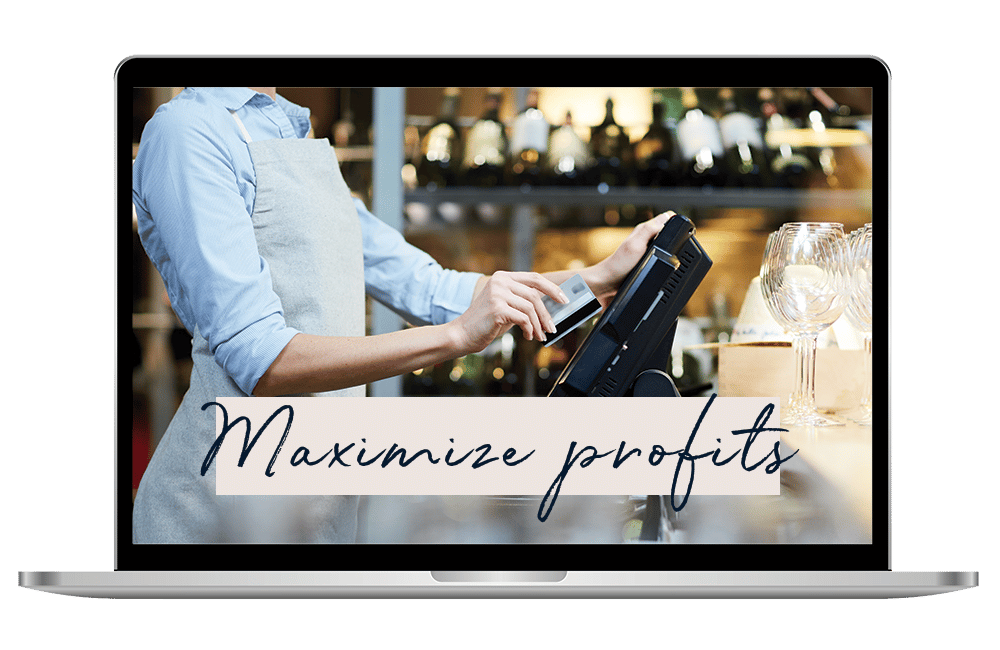
The three costly mistakes you could unknowingly be making?
Find out in this FREE guide and restaurant assessment specifically designed to reveal the unexpected hurdles standing between you and exponential business growth.
Thank You To Our Sponsors
Did You Know That 7 out of 10 Adults Dine Out To Celebrate Birthdays?
You Can Easily Capture This Lucrative Business!
For a limited time only, popmenu is offering our listeners $100 off your first month plus an unchanging lifetime rate.
Request a DEMO:
Want to become a podcast sponsor?
Please get in touch with Roger at roger@restaurantrockstars.com
